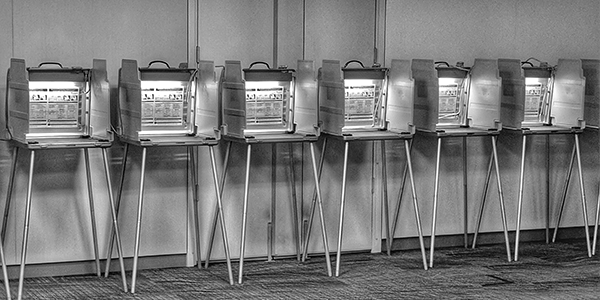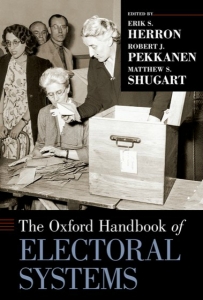Book Review | The Oxford Handbook of Electoral Systems edited by Erik S Herron, Robert J Pekkanen and Matthew S Shugart
Electoral systems are key components in the operation of representative democracies that vary considerably in their construction, with important consequences for how democracy is implemented. Ron Johnston reviews The Oxford Handbook of Electoral Systems which provides valuable overviews of many of the important topics studied by electoral system scholars, though he wonders about the relative value of such large and expensive volumes aimed at providing ‘state-of-the-art’ surveys and ‘compelling new perspectives’.

Polling station, California, 2018 Picture: Mark Gunn, via a CC BY 2.0 licence
The Oxford Handbook of Electoral Systems. Erik S. Herron, Robert J. Pekkanen and Matthew S. Shugart (eds). Oxford University Press. 2018.
 Elections, according to this volume’s editors, are central to the study of political science, and the systems used in their conduct are crucial because they can profoundly influence political outcomes. The rules that determine how votes are translated into election outcomes – such as deciding the winner in a presidential contest or the number of seats allocated to parties contesting election to a legislature – can influence what governments are formed, for example, and what policy directions are followed within a polity. The study of such systems thus involves not only appreciating their various forms and why one has been selected over others in a particular context, but also asking: how are the rules are modified, and with what effect? And are such systems and their myriad rules fair – and to whom?
Elections, according to this volume’s editors, are central to the study of political science, and the systems used in their conduct are crucial because they can profoundly influence political outcomes. The rules that determine how votes are translated into election outcomes – such as deciding the winner in a presidential contest or the number of seats allocated to parties contesting election to a legislature – can influence what governments are formed, for example, and what policy directions are followed within a polity. The study of such systems thus involves not only appreciating their various forms and why one has been selected over others in a particular context, but also asking: how are the rules are modified, and with what effect? And are such systems and their myriad rules fair – and to whom?
A large number of sovereign states now have some form of regular (at least quasi-democratic) elections, very few of which use exactly the same electoral system, as Michael Gallagher and Paul Mitchell illustrate in their excellent introductory chapter, ‘Dimensions of Variation in Electoral Systems’. Here, they identify six basic dimensions, indicative of the great variety of particular systems that have been introduced and then either modified along one or more of those dimensions, or replaced. Studies of those systems have therefore unsurprisingly stimulated a large and sprawling literature, which The Oxford Handbook of Electoral Systems surveys. Its 44 chapters, covering 996 pages produced by 54 authors (29 of whom occupy academic posts in the United States, including all three editors) are arranged in eight sections: ‘Foundations of Electoral Systems’; ‘Issues and Representation’ (covering topics such as ethnic minority and women’s representation); ‘Electoral Systems and the Wider Political System’ (subjects include direct democracy and constituency service); ‘Electoral Systems and Research Design’; ‘Holding Elections’ (their administration and integrity); ‘Electoral Systems in Context’; ‘Electoral Systems in the Context of Reform’; and ‘Electoral Systems in the Context of New Democracies’. The chapters in the first five are general and comparative; those in the last three comprise eighteen individual country case studies; with a few exceptions (including the United Kingdom), the focus is almost entirely on national-level electoral systems and elections.
In a book with such a large and broad scope, variations in chapter style, content and accessibility are unsurprising. Most chapters have a strong empirical base, but not all. Some, such as those on ‘Electoral Systems and Citizen-Elite Ideological Congruence’ and ‘Portfolio-Maximizing Strategic Voting in Parliamentary Elections’, are predominantly theoretical and, as such, present readers with assertions for which a research agenda is then needed for their testing. A few others are not general overviews either, but rather research reports, such as ‘Electoral System Effects on Party Systems’, the technical detail of which may test many readers.
Similarly, with such a large literature to review, many chapters are necessarily ‘biased’ in their focus on empirical material from selected countries only – notably the United States. UK readers might feel that the absence of much, if anything, written on their country weakens some of the overviews provided – on ‘Electoral Systems and Women’s Representation’ and on ‘Electoral Systems and Campaign Finance’, for example – and readers in many other countries may be similarly disappointed. Selected empirical material is provided in some, but its representativeness is not readily assessed. Furthermore, despite the breadth, there are clear lacuna in the coverage – very little, for example, on electoral campaigning and canvassing (practices that vary substantially both between and within different electoral systems), other than the material on campaign finance.
Most of the case study chapters relate to countries in the ‘Western developed world’: plenty is readily available on many of those countries, so why not something on Russia, plus a selection of post-Communist states to the west and south of the Russian Federation which have been experimenting with electoral systems over the last three decades in some intriguing ways (only Ukraine gets a chapter)? Similarly, there is just one Latin American and one African case study (South Africa in the latter case) and only four from Asia (including Israel). Each of the chapters included provides an excellent overview of the different systems and their changes – from systems (Israel and the Netherlands, for example) that have no districts, through single-member district systems to those (but only a few) systems designed to achieve (near-) proportional representation based solely on multi-member districts. The chapter in another section on ‘Electoral Systems in Authoritarian States’, authored by Jennifer Gandhi and Abigail L. Heller, is a particularly valuable introduction to elections in such circumstances.
All that being said, the majority of the chapters provide informative overviews of their subject matter, giving readers a good introduction to the available material bolstered by extensive references. In a quote cited by one of the authors, William Riker said of comparative work that ‘much of what passes as scientific investigation in our field is no more than elaboration of unique detail, e.g. the case study of a particular event’. The best chapters in this handbook avoid that – and the best case studies provide the necessary empirical foundations for valid comparative work, of which there is need for much more.
The value of these (expensive) handbooks is difficult to assess: at the price at the time of writing (£115 on the publisher’s website), there will be very few individual purchasers and many libraries may baulk at the amounts they subtract from increasingly tight budgets. More importantly, such volumes are undoubtedly at least obsolescent in some parts almost as soon as they are published: Lisa Handley’s otherwise excellent review of redistricting, for example, only mentions the major change to the UK’s rules, legislated in 2011, in a footnote – and, of course, coverage of the ever-changing legal situation regarding gerrymandering in the USA is not up-to-date. There is much debate about the end-of-the-book and its replacement by web-based resources that can be regularly updated, but publishers currently seem committed to handbooks, and similarly titled volumes, such as this, which Oxford University Press claims offers not only ‘an authoritative and state-of-the-art survey of current thinking and research’ but also provides ‘scholars and graduate students with compelling new perspectives’. So there is clearly a sufficient market for them to more than cover the costs. But I still wonder how much use they get.
But The Oxford Handbook of Electoral Systems now exists. It is a massive store of knowledge and information, with many of its chapters providing valuable and – one hopes for the authors’ sake – accessible and accessed resources.
This review gives the views of the author, and not the position of Democratic Audit. It was first published on the LSE Review of Books blog.
Ron Johnston is a professor in the School of Geographical Sciences at the University of Bristol and the author of a number of studies of British political finance, including (with Charles Pattie) Money and Electoral Politics (Policy Press, Bristol, 2014). Read more by Ron Johnston.





 Democratic Audit's core funding is provided by the Joseph Rowntree Charitable Trust. Additional funding is provided by the London School of Economics.
Democratic Audit's core funding is provided by the Joseph Rowntree Charitable Trust. Additional funding is provided by the London School of Economics.